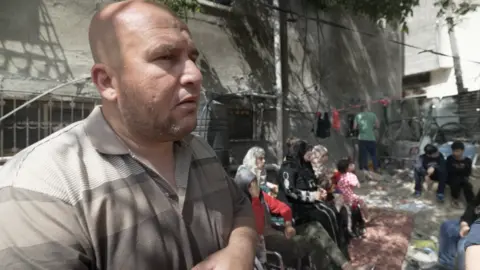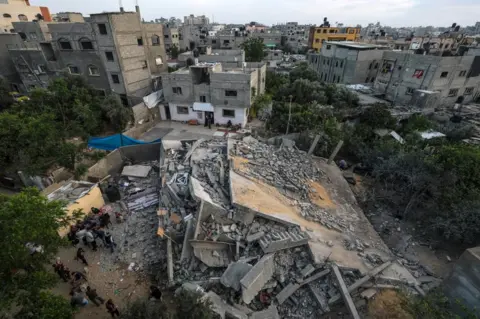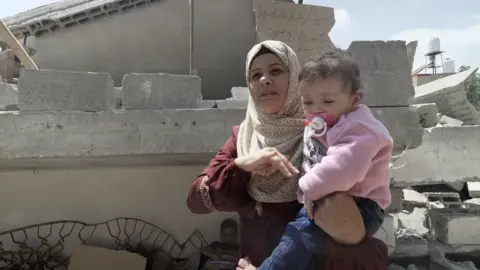Israel-Gaza: Palestinian family left homeless after strikes
 BBC
BBCKamal Nabhan was screaming as he thrust the phone into his cousin's hands, unable to believe what the anonymous caller was telling him.
The men had just got ready to go to afternoon prayers in Jabalia refugee camp. But the routine patterns of life were about to give way to violent destruction, wrought from above with a warning call.
Kamal's cousin Ataf reached out to his relative.
"I took the phone from him and talked to the person on the line," says Ataf. "He said he was from Israeli intelligence, and you have five minutes to evacuate the house."
They began to rush back, telling the Israeli caller he must be mistaken because the building "was full" of disabled people. "[The intelligence officer] said: 'No, immediately evacuate the house,'" says Ataf.
It was day five of the fiercest Israeli air strikes on Gaza in nine months. The campaign of so-called targeted assassinations killed at least six leading figures in Islamic Jihad, the Palestinian territory's second most powerful militant organisation.
But the attacks also killed 10 civilians on the first night alone - including wives and children of some of the men targeted as they slept. The group retaliated with waves of rocket attacks on Israeli cities, forcing tens of thousands to take cover in bomb shelters.
Israel said it was acting after repeated rounds of rocket fire by Islamic Jihad, which in turn said it had fired because of police raids against Palestinians at al-Aqsa mosque in occupied east Jerusalem, and the recent death in Israeli jail of hunger striker Khader Adnan.
Last week's fighting killed 33 Palestinians in Gaza and two people in Israel - an Israeli and a Palestinian. It left more than 1,200 Palestinians displaced, according to the UN.
At the Nabhan family's building, Israel delivered on its warning. A single missile blew the block apart.
 Reuters
ReutersJust before a ceasefire deal was agreed late on Saturday, Israel destroyed several other residential blocks in similar circumstances - giving warnings to evacuate residents before bombing the buildings. These strikes that bring down whole apartment blocks are a well-worn tactic in its attacks on Gaza.
Israel says the buildings it hit were used as "command and control centres" by Islamic Jihad to direct rocket launches. It said its warning calls were meant to prevent harm to uninvolved civilians.
Local sources believe a militant lived in the building but not that it was an operational centre. Human rights groups condemn such attacks destroying entire residential blocks as a violation of international law. Another resident who received a warning call was filmed pleading with Israeli forces to limit any attack "to the apartment of the guilty".
The building in Jabalia has collapsed into its own foundations. An entire staircase that provided the escape route for several families lies horizontally, jutting into a smashed wall section. The remains of the roof are a few metres above the earth, providing the only shade for the former residents. Neighbours managed to get everyone out - nearly 50 people from eight families.
There were five people in the building with disabilities including muscular dystrophy, say support groups. Some had wheelchairs, specially modified beds and medicines destroyed in the air strike, they add.
Jamal al-Rozzi, executive director of the Gaza-based Society for Rehabilitation, who came to help the families, says his group will provide aid including food and medical devices.
"I feel angry and I feel pain because this should not happen, at least not for the civilians, especially not disabled people," he says.
Also sheltering among the rubble is another of Kamal Nabhan's relatives. Rahma Nabhan and her husband Yasser are sitting under a fractured roof slab, passing their baby daughter Jori to each other to soothe her cries.

"My sisters-in-law are disabled - they were not able even to cover their heads [when they were rescued], their wheelchairs were buried under the house," says Rahma.
"Everyone saw the disabled people fleeing. They were asking: 'Why did the house have to be destroyed? Have these disabled people fired rockets?' We have nothing to do with what's going on," she says.
Rahma walks me around the remnants, still clutching Jori as we navigate the rubble.
Her flat was on the top floor. Now there are only cardboard signs the residents have hoisted over the concrete remains, showing the names of each former inhabitant.
"We are not going anywhere, we will stay in the sun, sleep in the sun, we are not leaving the house," says Rahma.
"We call on the international organisations and [Palestinian President Mahmoud Abbas] to stand with us and rebuild this house because we have no place to go," she says.
The ceasefire reached on Saturday night, mediated by Egypt, has largely held. But tensions remain extremely high, after months of spiralling violence in the occupied West Bank which has spilt over into Gaza on three major occasions since an all-out war between Israel and Hamas in May 2021.
Last week's attacks have left Israeli Prime Minister Benjamin Netanyahu politically emboldened. They could easily have ignited a far bigger confrontation - in fact they still could despite the truce. But he has used the fighting to burnish his reputation for security in the face of unprecedented domestic unrest and growing pressure from religious-ultranationalist extremists in his coalition.
Despite its losses, Islamic Jihad has used the escalation to promote its appeal as the current face of armed resistance against Israel while Hamas - the dominant militant group in Gaza - stayed on the sidelines in terms of military action.
It publicly backed the rocket fire as part of a "unified" position by Palestinian factions but effectively restrained itself, thereby limiting the round of fighting. It also has to keep services running for Gaza's population under a crippling Israeli-Egyptian blockade. A larger war could swing popular opinion further against it.

Since 2021, the Israeli government has given permits to thousands of workers to cross into Israel, boosting Gaza's economy and bolstering tax revenues for Hamas. However, the group has warned against annual plans for an ultranationalist Israeli flag march through Muslim areas of occupied east Jerusalem on Thursday, keeping tensions boiling.
Both Hamas and Islamic Jihad are listed by Israel and the West as terrorist organisations.
However, many Palestinians here feel abandoned by an international community that still talks about a political future for the region - a two-state solution - which is outright rejected by both Israel's nationalist government and the Palestinian armed groups.
At the Nabhans' house, neighbours and other Gaza-based charities arrive for a gathering in solidarity with the residents. It comes on the same day Palestinians mark the 75th anniversary of the Nakba, when 700,000 people fled or were forced from their homes in the conflicts surrounding Israel's creation.
The homeless residents hold up signs saying "Protect us" and "We call for help".
Ataf Nabhan, who took the warning call from the Israeli intelligence officer, gestures to the rubble and tells me his plea is simple.
"This family needs a shelter," he says. "We just ask the human rights organisations - take care of this family."
